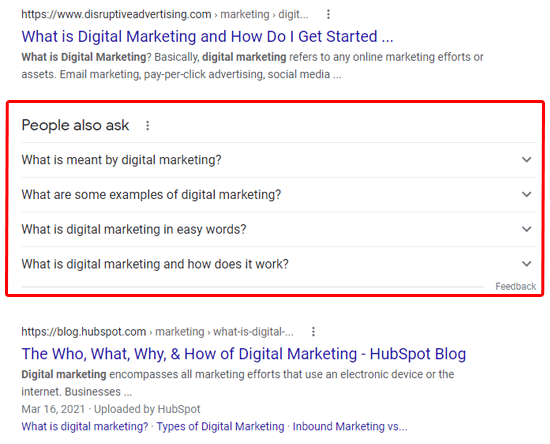In the ever-evolving world of SEO, it is essential to keep up with the latest trends and techniques to stay ahead of the competition. One such technique is the use of an FAQ schema guide.
As you might have guessed, the FAQ schema is a type of structured data markup that helps search engines understand the contentof your website better. It is designed to display the most relevant and helpful answers to user queries in search engineresults pages (SERPs) by showcasing frequently asked questions (FAQs) and their corresponding answers directly within the search results.
What Is FAQ Schema Markup?
FAQ schema is a type of structured data markup that provides search engines with a more precise understanding of the content on your website. It helps search engines display the most relevant and useful information to users by showing frequently asked questions (FAQs) and their corresponding answers directly within the search results.
To implement FAQ schema markup, you need to use a specific set of HTML tags that inform search engines of the questions and answers present on your web pages. Once the search engines understand your content, they can display it in a prominent position in the SERPs.
Why Use FAQ Schema Markup?
Using FAQ schema markup can provide a range of benefits, including:
Improved Click-Through Rates (CTR)
FAQ schema markup makes your website more attractive and informative to users by displaying the most relevant answers to their queries directly in the SERPs. This can lead to higher click-through rates and increased traffic to your website.
Increased Visibility In Search Engine Results
FAQ schema markup makes it easier for search engines to understand the content of your website and display it more prominently in the SERPs. This can lead to increased visibility and exposure for your website.
Improved User Experience (UX)
FAQ schema markup provides users with quick and easy access to the information they are looking for. By displaying relevant FAQs and answers directly in the SERPs, users can quickly find the information they need without having to click through to your website. This can improve the overall user experienceof your website.
How To Implement An FAQ Schema Guide
Implementing FAQ schema markup on your website is relatively straightforward. Here are the steps you need to follow:
Step 1 - Identify Frequently Asked Questions
The first step in implementing FAQ schema markup is to identify the most commonly asked questions related to your business, products, or services. These could be questions that you receive through customer support channels, email, or social media.
Step 2 - Create Structured Data Markup
Once you have identified the frequently asked questions, you need to create structured data markup for each question and answer. You can do this using the JSON-LD format or Microdata.
Step 3 - Add The Markup To Your Website
After creating the structured data markup, you need to add it to your website's relevant pages. You can add the markup to individual pages or across your entire website, depending on your requirements.
Step 4 - Test And Validate The Markup
Finally, you need to test and validate the markup to ensure that it is working correctly. You can use the Google Structured Data Testing Tool to validate the markup and ensure that it meets Google's guidelines.

FAQs Schema Guide - How to display FAQ on Google Search Results
Common Mistakes To Avoid
While implementing FAQ schema markup is relatively straightforward, there are some common mistakes that you should avoid. These include:
Including Irrelevant Or Duplicate Questions
Make sure that the questions and answers you include in your FAQ schema markup are relevant and unique. Avoid including duplicate questions or those that are not relevant to your website or business.
Failing To Provide Accurate Answers
Ensure that the answers you provide in your FAQ schema markup are accurate and up-to-date. Inaccurate or outdated information can lead to a negative user experience and harm your website's credibility.
Not Using Proper Markup Structure
It is essential to use the proper markup structure when implementing FAQ schema. Failure to use the correct HTML tags or JSON-LD format can lead to errors and prevent search engines from understanding your content correctly.
Overusing FAQ Schema Markup
Avoid overusing FAQ schema markup on your website. While it can provide numerous benefits, using it excessively can lead to penalties from search engines and harm your website's rankings.
How To Track The Performance Of Your FAQ Schema Markup
Tracking the performance of your FAQ schema markup can help you determine its effectiveness and identify any areas for improvement. By monitoring key metrics such as click-through rates and user engagement, you can optimize your FAQ schema markup to improve your website's search engine rankings and user experience.
Setting Up Analytics
The first step in tracking the performance of your FAQ schema markup is to set up analytics on your website. Google Analyticsis a popular tool that can provide valuable insights into your website's performance, including the effectiveness of your FAQ schema markup.
By setting up Google Analytics and integrating it with your website, you can track key metrics such as click-through rates, bounce rates, and user engagement.
Tracking Click-Through Rates
One of the most important metrics to track when analyzing the performance of your FAQ schema markup is click-through rates (CTR). CTR is a measure of how many users click on your FAQ schema markup in the SERPs compared to the number of impressions it receives.
By tracking your CTR over time, you can determine whether your FAQ schema markup is effectively attracting clicks and driving traffic to your website.
Analyzing User Engagement
Another key metric to track when analyzing the performance of your FAQ schema markup is user engagement. User engagement measures how users interact with your website, including how long they stay on your site, how many pages they visit, and how frequently they return.
By tracking user engagement, you can determine whether your FAQ schema markup is providing valuable information to your users and keeping them engaged with your website.
Identifying Areas for Improvement
Tracking the performance of your FAQ schema markup can help you identify areas for improvement and optimize your website's search engine rankings and user experience. For example, if you notice that your FAQ schema markup has a low CTR, you may need to revise your questions and answers to make them more engaging and relevant to your target audience.
Similarly, if you notice that users are not engaging with your FAQ schema markup, you may need to improve the formatting or placement of your FAQ section to make it more accessible and user-friendly.
People Also Ask
What Is The Difference Between JSON-LD And Microdata For FAQ Schema Markup?
JSON-LD and Microdata are two formats that can be used for FAQ schema markup. While both are acceptable, JSON-LD is the recommended format by Google. JSON-LD is easier to read, allows for more flexibility in structuring data, and is more easily understood by search engines.
Does Using FAQ Schema Markup Guarantee Higher Search Engine Rankings?
While using FAQ schema markup can provide numerous benefits, including improved search engine visibility, it does not guarantee higher search engine rankings. Other factors, such as high-quality content, relevant keywords, and user experience, also play a significant role in determining search engine rankings.
What Are The Benefits Of Using FAQ Schema Markup?
Using FAQ schema markup can provide numerous benefits, including improved click-through rates, increased visibility in search engine results, and improved user experience. By displaying relevant FAQs and answers directly in the SERPs, users can quickly find the information they need without having to click through to your website.
Is FAQ Schema Markup Only Suitable For E-commerce Websites, Or Can It Be Used On Other Types Of Websites?
Answer: FAQ schema markup is suitable for all types of websites, not just e-commerce websites. Any website that features frequently asked questions and their corresponding answers can benefit from using FAQ schema markup to improve its search engine rankings and user experience.
Conclusion
In conclusion, an FAQ schema guide is essential for website owners looking to improve their search engine rankings, visibility, and user experience. By providing relevant and useful answers to frequently asked questions directly in the SERPs, website owners can attract more traffic and provide a better user experience for their visitors.
Implementing FAQ schema markup is relatively straightforward, but it is essential to avoid common mistakes that can harm your website's credibility and search engine rankings. By following the guidelines outlined in this article, you can implement FAQ schema markup correctly and reap its many benefits.
